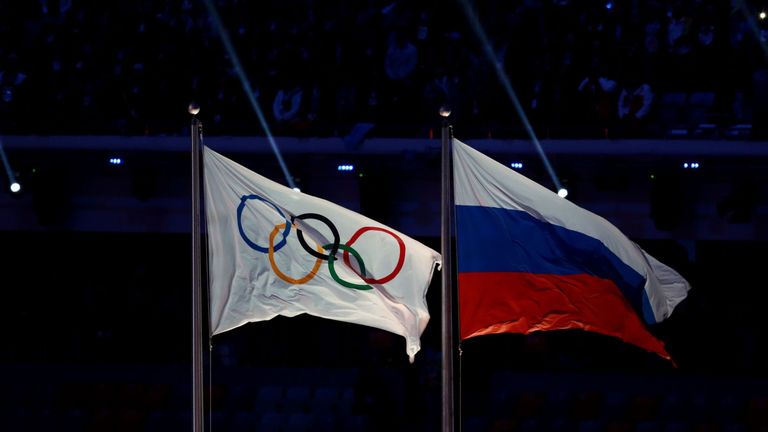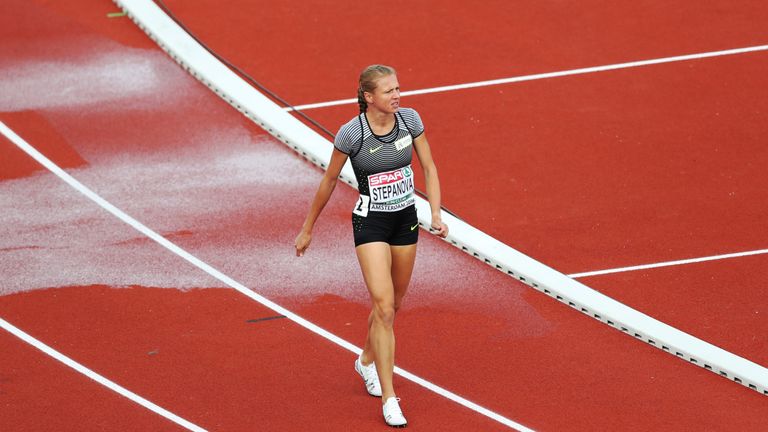IOC opts against blanket ban on Russians at Rio Olympics
Sunday 24 July 2016 18:43, UK
The International Olympic Committee has opted not to impose a blanket ban on Russians competing in Rio de Janeiro next month.
The IOC was considering the sanction in light of the latest report into state-sponsored Russian doping, and the Court of Arbitration for Sport's decision to uphold a ban on 68 of the country's track-and-field competitors.
But it will now be down to individual sports federations to decide if their Russian members can go to Rio, although the IOC board has provided a list of criteria that must be met between now and the start of the Games on August 5.
No athlete guilty of a previous doping offence will be allowed to compete, "even if he or she has served the sanction".
And federations must "carry out an individual analysis of each athlete's anti-doping record, taking into account only reliable adequate international tests".
All athletes cleared to compete must have their places upheld by an expert from CAS' list of independent arbitrators and will then be "subject to a rigorous additional out-of-competition testing programme."
IOC president Thomas Bach defended the decision to open the door to some Russian participation, saying: "It's fine to talk about collective responsibility, but at the end of the day you have to be able to look in the eyes of every athlete concerned."
And Russia's sports minister Vitaly Mutko said: "We are very grateful to the executive committee for the decision.
"We do realise the complexity of problem that faced the IOC when they got the report. We do understand the need to discuss the problem, but we are grateful that when the committee considered the right of each athlete they realised that those who are clean from doping have the right to participate."
The World Anti-Doping Agency had led calls for a blanket ban this month after a report it commissioned uncovered evidence of systematic manipulation of urine samples at the 2014 Winter Olympics in Sochi.
Russia's anti-doping agency was already suspended in the wake of previous findings, and the International Association of Athletics Federations took the decision in November to ban the country's track-and-field competitors from international action.
Speaking after the IOC verdict, IAAF boss Seb Coe said his organisation was ready to advise other sports between now and Rio.
"We have created and been through the process," he said. "We know how hard it is emotionally and rationally to get the process right."
Yuliya Stepanova, meanwhile, the 800m runner whose evidence first alerted the authorities to state-sponsored doping in Russia, has been told she cannot compete in Rio as a neutral athlete.
The IOC board sought the advice of its Ethic Commission, which said "the circumstances in which she denounced the doping practices which she had used herself, do not satisfy the ethical requirements for an athlete to enter the Olympic Games."
As a Russian with a doping offence on her record, Stepanova would have fallen foul of the IOC's strict criteria in any case, although her role as a whistle-blower was recognised with an invitation to the Games.
"Furthermore," a statement said, "the IOC is ready to support Mrs Stepanova so that she can continue her sports career and potentially join a National Olympic Committee."
The decision to ban Stepanova was immediately branded "incomprehensible" by the United States Anti-Doping Agency, whose head Travis Tygart also said the call to hand responsibility to individual sports had left a "confusing mess".
The UK Government's sports minister Tracey Crouch said: "While this is solely a decision for the IOC the scale of the evidence...arguably pointed to stronger sanctions."





